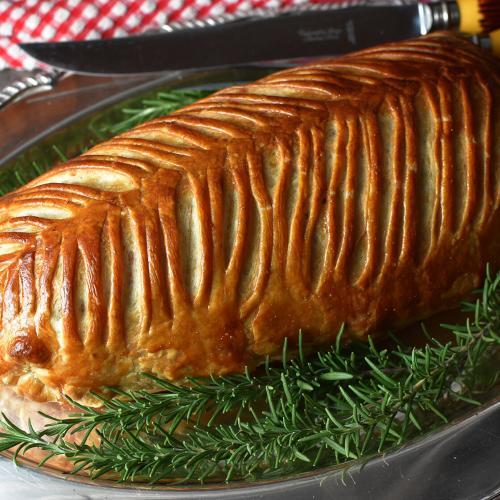
Beef Wellington with Sauce Béarnaise
A fulfilling meal best served thickly sliced with the Béarnaise sauce on the side.
Equipment
Ingredients
- 12 oz Portobello Mushroom Caps
- 2 tbsp unsalted butter softened
- 1 1/3 tbsp Vegetable Oil divided
- 1 large shallot(s) finely chopped to 1/4 cup
- kosher salt and freshly ground black pepper
- 1 tbsp flat-leaf (Italian) parsley fresh and finely chopped
- 2 lbs beef tenderloin centre-cut, trimmed, side muscle removed
- 2 Large Crêpes 14-inch (purchased from a crêperie, or make your own)*
- 2/3 cup Chicken Liver Pâté homemade or store-bought, room temperature
- 14-16 oz all-butter puff pastry thawed or make your own **
- 1 large egg lightly beaten
Instructions
To Make the Duxelles
- Clean the mushroom caps, then remove the stems and gills. Cut the caps into 1-inch pieces, and place them in the bowl of a food processor. Pulse until they are finely chopped—about 10-15 pulses.
- Heat the butter and one (1) tablespoon vegetable oil in a 10-inch skillet over medium-low heat. Add the shallots and cook, stirring often, until translucent, 3 to 4 minutes.
- Add the chopped mushrooms, stir well, and raise the heat to medium. Cook, occasionally stirring, until the mushrooms have cooked down and are very dark, about 15-20 minutes. Season with salt and freshly ground black pepper. Stir in the parsley; then transfer to a small bowl and cool completely.
- The duxelles can be made a day ahead, refrigerated, then brought back to room temperature. When ready to assemble and bake, mash the pâté and the duxelles with a fork in a medium bowl until they form a soft paste.
Assemble and Bake the Wellington
- Remove the beef from the refrigerator about an hour ahead to bring it to room temperature. Pat dry and season all over with salt and pepper. Heat the remaining 1 teaspoon oil in a 12-inch skillet over medium-high heat until very hot. Sear the beef until it is evenly browned, 2 to 3 minutes per side. Transfer the beef to a platter and cool.
- Lay the crêpes on a clean work surface, overlapping them just enough to give you an approximately 13-inch square surface. Next, measure the length of the seared tenderloin and trim the crêpe base to be 13 inches by the size. In my case, it was 8 inches. (My crêpe base ended up being 13 inches by 8 inches.)
- Dot the pâté mixture over the crêpes, then use an offset spatula to spread it evenly across the crêpes’ surface.
- Place the seared and cooled tenderloin in the centre of the crêpes and carefully wrap them around the filet, pressing and moulding them into place using the duxelles mixture as the “glue.” Trim the ends of the crêpes.
- On a lightly floured surface, roll out the puff pastry to a 13×16-inch rectangle. Arrange the pastry so that the long side is towards you.
- Transfer the crêpe-wrapped beef to the centre of the pastry, perpendicular to the 16-inch base. Bring the pastry up around the beef, smoothing out any air pockets. Brush some of the beaten egg along the bottom edge of the seam and then press gently to seal; trim off any excess. Seal the pastry on the ends with egg wash, folding as you would gift wrap a package.
- Line a large, rimmed baking sheet with parchment. Lift the Wellington onto the sheet, turning it seam side down as you transfer it. Refrigerate for at least an hour. Then 20 minutes before baking, position a rack in the centre of the oven and heat the oven to 475°F.
- Brush the Wellington with the remaining beaten egg. Using a sharp knife, very lightly score the surface of the pastry with decorative lines (see photos), being careful not to cut all the way through the pastry. Put the Wellington in the oven and immediately reduce the temperature to 425°F. Roast for 10 minutes, then reduce the heat to 400°F and roast an additional 20 minutes for rare and 25 minutes for medium-rare. Transfer to a carving board and let the Wellington rest for 10 minutes.
Notes
While the Wellington rests, make the Béarnaise sauce (recipe below).
*Make your own crepes.
**My homemade puff pastry.
**My homemade puff pastry.
Tried this recipe?Let us know how it was!